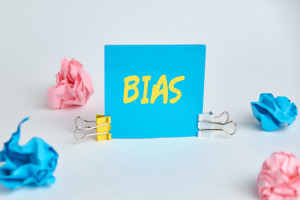 When we say fatphobia, what we’re talking about is anti-fat bias. Fatphobia is the more common expression because it’s cribbed from the same linguistic conventions that resulted in the hatred of queer people being called “homophobia.” Phobias are uncontrollable personal fears; anti-fat bias exists by design. For the purpose of this discussion, we will use the words interchangeably, but hope you will work to reframe anti-fat bias for what it is.
When we say fatphobia, what we’re talking about is anti-fat bias. Fatphobia is the more common expression because it’s cribbed from the same linguistic conventions that resulted in the hatred of queer people being called “homophobia.” Phobias are uncontrollable personal fears; anti-fat bias exists by design. For the purpose of this discussion, we will use the words interchangeably, but hope you will work to reframe anti-fat bias for what it is.
We define it as a series of interconnected society-level systems, fueled by a $72 billion weight loss industry, that works to diminish the humanity of fat people. These systems express themselves in a number of ways, both throughout our daily lives and within our minds. On a macro level, it can show up as public spaces failing to accommodate fat people, retailers limiting available clothing options to exclude fat customers, or the medical industry viewing fatness as a disease to be eradicated. It can be a hiring manager looking at two similarly qualified candidates and choosing the thinner one because they believe the fatter one is fat because they are lazy or stupid or lack self-discipline, or that a fatter employee will drive up healthcare costs for the company. It can be a loved one deflecting a fat person’s request for empathy with an admonition to drop some weight and they’ll feel better. It can be someone who is looking for a partner excluding fat potential partners in a dating search because they have “preferences”. It can even be overt and personal name-calling or catcalling, but most often anti-fat bias is more subtle, so deeply is it ingrained into the fabric of society.
Anti-fat bias doesn’t impact all fat people equally. It disproportionately impacts those who live with multiple marginalizations. Fat Black, Indigenous, and People of Color feel the economic impact of size discrimination more acutely than white fat people. The same holds true for disabled fat people, queer fat people, trans fat people, and poor fat people. One form of oppression stacks upon another as stereotypes stack or are mutually reinforced.
Anti-fat bias also operates within our own heads as fat people. It can show up as negative self-talk that echoes negative messages about fatness that we hear from family members, friends, the media, the medical industrial complex, and the diet industry. It can show up as fear of drawing attention to one’s self, or as a sneaky belief that we deserve to be treated “less than” because we’re fat. It is also sometimes a driving factor behind disordered eating.
We can even project our internalized anti-fat bias when we judge other fat people or compare ourselves favorably in comparison to other fat people. It can show up within body positive spaces as a “good fatty/bad fatty” dialogue, where “healthy” fat people or “fit” fat people are esteemed and “unhealthy” or “unfit” fat people are looked down upon. It can show up in mainstream fat liberation spaces when feedism is labeled as bad or exploitative, or in kink-friendly fat spaces where feedism is shunned.
Being fat yourself, and/or being attracted to fat people does little to eliminate anti-fat bias alone – it has to be worked at, constantly, because it will constantly try to re-establish its grip on your life, fat or thin, feedist or FA.
